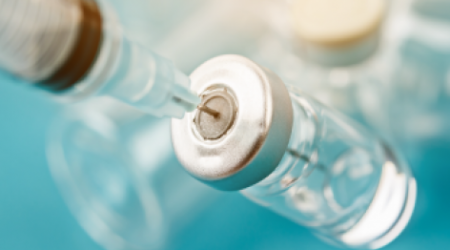The U.S. Conference of Catholic Bishops, which includes Bishop Talley and Bishop Emeritus Steib, have shared the following news release today on the use of the Johnson & Johnson COVID-19 Vaccine. We also included the USCCB news from Dec. 14, 2020, as another reference. Let’s continue with many prayers to our Lord in our vaccine decisions with immense love, faith, hope and care for our families and ourselves.
March 2, 2021
U.S. Bishop Chairmen for Doctrine and for Pro-Life Address the Use of the Johnson & Johnson Covid-19 Vaccine
On March 2, Bishop Kevin Rhoades, Fort Wayne-South Bend, Chairman of the U.S. Conference of Catholic Bishops’ Committee on Doctrine, and Archbishop Joseph Naumann, Kansas City, Kansas, Chairman of the USCCB’s Committee on Pro-Life Activities, issued a statement on the Johnson & Johnson COVID-19 vaccine recently approved for use in the United States.
“The approval of Johnson & Johnson’s COVID-19 vaccine for use in the United States again raises questions about the moral permissibility of using vaccines developed, tested, and/or produced with the help of abortion-derived cell lines.
“Pfizer and Moderna’s vaccines raised concerns because an abortion-derived cell line was used for testing them, but not in their production. The Johnson & Johnson vaccine, however, was developed, tested and is produced with abortion-derived cell lines raising additional moral concerns. The Congregation for the Doctrine of the Faith has judged that ‘when ethically irreproachable COVID-19 vaccines are not available … it is morally acceptable to receive COVID-19 vaccines that have used cell lines from aborted fetuses in their research and production process.’[1] However, if one can choose among equally safe and effective COVID-19 vaccines, the vaccine with the least connection to abortion-derived cell lines should be chosen. Therefore, if one has the ability to choose a vaccine, Pfizer or Moderna’s vaccines should be chosen over Johnson & Johnson’s.
“While we should continue to insist that pharmaceutical companies stop using abortion-derived cell lines, given the world-wide suffering that this pandemic is causing, we affirm again that being vaccinated can be an act of charity that serves the common good.”
For further details, we refer people to our earlier December2020Statement, to our AnswersKeyEthicalQuestionsAboutCOVID-19Vaccines, to the CongregationDoctrineFaithNote, and to the StatementVaticanCOVID-19CommissionCollaborationPontificalAcademyforLife.
[1]Congregation for the Doctrine of the Faith, “Note on the morality of using some anti-COVID-19 vaccines” (17 Dec 2020), no.2.
December 14, 2020
U.S. Bishop Chairmen for Pro-Life and Doctrine Address Ethical Concerns on the New COVID-19 Vaccines
WASHINGTON–Bishop Kevin Rhoades, Fort Wayne-South Bend, Chairman of the U.S. Conference of Catholic Bishops’ Committee on Doctrine, and Archbishop Joseph Naumann, Kansas City, Kansas, Chairman of the USCCB’s Committee on Pro-Life Activities, issued a statement on the new COVID-19 vaccines. In their statement, the Bishops address the moral concerns raised by the fact that the three vaccines that appear to be ready for distribution in the United States all have some connection to cell lines that originated with tissue taken from abortions.
With regard to the Pfizer and Moderna vaccines, they concluded:
“In view of the gravity of the current pandemic and the lack of availability of alternative vaccines, the reasons to accept the new COVID-19 vaccines from Pfizer and Moderna are sufficiently serious to justify their use, despite their remote connection to morally compromised cell lines.
“Receiving one of the COVID-19 vaccines ought to be understood as an act of charity toward the other members of our community. In this way, being vaccinated safely against COVID-19 should be considered an act of love of our neighbor and part of our moral responsibility for the common good.”
With regard to the AstraZeneca vaccine, the Bishops found it to be “more morally compromised” and consequently concluded that this vaccine “should be avoided” if there are alternatives available.
“It may turn out, however, that one does not really have a choice of vaccine, at least, not without a lengthy delay in immunization that may have serious consequences for one’s health and the health of others,” the bishop chairmen stated. “In such a case … it would be permissible to accept the AstraZeneca vaccine.”
At the same time, the Bishops also warned that Catholics “must be on guard so that the new COVID-19 vaccines do not desensitize us or weaken our determination to oppose the evil of abortion itself and the subsequent use of fetal cells in research.”
The full statement from the Bishop Chairmen may be found here.

